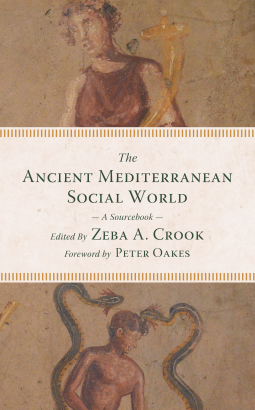
The Ancient Mediterranean Social World
A Sourcebook
by Edited by Zeba A. Crook
This title was previously available on NetGalley and is now archived.
Send NetGalley books directly to your Kindle or Kindle app
1
To read on a Kindle or Kindle app, please add kindle@netgalley.com as an approved email address to receive files in your Amazon account. Click here for step-by-step instructions.
2
Also find your Kindle email address within your Amazon account, and enter it here.
Pub Date May 07 2020 | Archive Date Nov 05 2022
Talking about this book? Use #TheAncientMediterraneanSocialWorld #NetGalley. More hashtag tips!
Description
What was the ancient world like?
Ancient sources tell us a great deal about the cultural patterns and values that prevailed in the Mediterranean of the biblical periods:
- how they constructed identity
- how they exercised control over groups, space, gender, and dress
- how they thought of friendship
- how they participated in social and economic exchange
- how ritual functioned and how kinship was constructed
- what healing practices, evil eye, and altered states of consciousness tell us about their sciences
- how they talked about each other behind their backs, and why
The Ancient Mediterranean Social World makes the rich social context of the ancient Mediterranean available to readers through succinct introduction of key ideas, thoughtful selection of translated primary sources, and extensive cataloging of relevant primary sources.
Zeba Crook brings together leading scholars to write on twenty different topics, from patronage to gender to loyalty to evil eye. Each chapter opens with an introduction to the topic, offers a short list of secondary sources, and an extensive list of primary sources. The passages in each chapter reflect the vast array of sources roughly from Homer to Augustine, including epigraphical, papyrological, literary, historical, philosophical, biblical, and dramatic texts.
This authoritative volume serves as a ready reference for the novice and experienced scholar alike.
Contributors:
Alicia J. Batten, Giovanni B. Bazzana, Agnes Choi, Zeba A. Crook, John W. Daniels Jr., Dennis C. Duling, John H. Elliott, Amy Marie Fisher, Mischa Hooker, Emil A. Kramer, Jason T. Lamoreaux, Dietmar Neufeld, Jerome H. Neyrey, SJ, Douglas E. Oakman, Ronald D. Roberts, Richard L. Rohrbaugh, Colleen Shantz, Gary Stansell, Eric C. Stewart, Erin K. Vearncombe, and Ritva H. Williams.
Table of Contents:
Part I Institutions
1. Economy
2. Kinship
3. Patronage
Part II Social Interaction
4. Honor
5. Shame
6. Collectivism
7. Gossip
8. Space
9. Gender
Part III Social Interaction with God and the Gods
10. Ritual, Domestic
11. Ritual, Public
12. Purity
13. Alternate States of Consciousness
14. Healing
Part IV Social Commodities
15. Loyalty
16. Friendship and Gifts
17. Limited Good and Envy
Part V Social Subterfuge and Control
18. Deviance
19. Mockery and Secrecy
20. Evil Eye
Advance Praise
“This book is a triumphant demonstration of how major social-scientific models used in biblical interpretation have the closest of connections with ancient Mediterranean culture, of how the etic embraces the emic. Across a range of critical issues—such as economy, kinship, patronage, honor and shame, collectivism, gossip, space, gender, ritual, purity, and the evil eye—the contributors uncover a mother lode of primary evidence from Judean, Greek, and Latin texts, inscriptions, and papyri. It represents a unique and indispensable resource for understanding the ancient social contexts in relation to which we must interpret the biblical texts for their historical meaning.”
— Philip F. Esler
University of Gloucestershire
“If the past is a foreign country, then Crook’s sourcebook gives readers the tools to enter and experience that foreign culture. It primes them to articulate both traditional and newer social-scientific frameworks that can help guide their reading and interpretation of ancient texts. Drawing on a diverse range of sources, from Graeco-Roman philosophy and history to the Dead Sea Scrolls, from New Testament and early Christian texts to rabbinic literature, such a resource ensures that we understand as best we can the lived experience of the people represented in ancient texts and that we are not misled by our modern, often anachronistic assumptions, about society and culture.”
— Sarah E. Rollens
Rhodes College
“Social-scientific criticism of the New Testament entails the creation of models that are useful for explaining how people in the ancient Mediterranean understood and experienced their social world. This helpful sourcebook provides carefully chosen selections from the varied ancient texts that undergird the models applied in traditional and emergent areas of social-scientific criticism, from patronage and honor to space and secrecy. It is an indispensable resource for students and scholars of the social contexts of the New Testament.”
— Anthony Keddie
University of British Columbia
“A valuable provision for biblical study, presented in a way readily accessible to every student and scholar. Whatever your approach to the biblical text, you will find that the use of this collection of texts will considerably enrich your study.”
— Peter Oakes
from the foreword
Review of Biblical Literature
“This volume is another helpful demonstration of how much social-scientific criticism can illuminate social, cultural, and historical contexts of the ancient Mediterranean not self-evident to twenty-first-century readers, reduce anachronistic and ethnocentric interpretations, and reinforce the fact that interpreters can never achieve the status of an objective observer.”
Available Editions
| EDITION | Hardcover |
| ISBN | 9780802873569 |
| PRICE | $65.00 (USD) |



